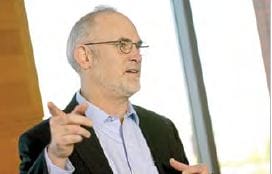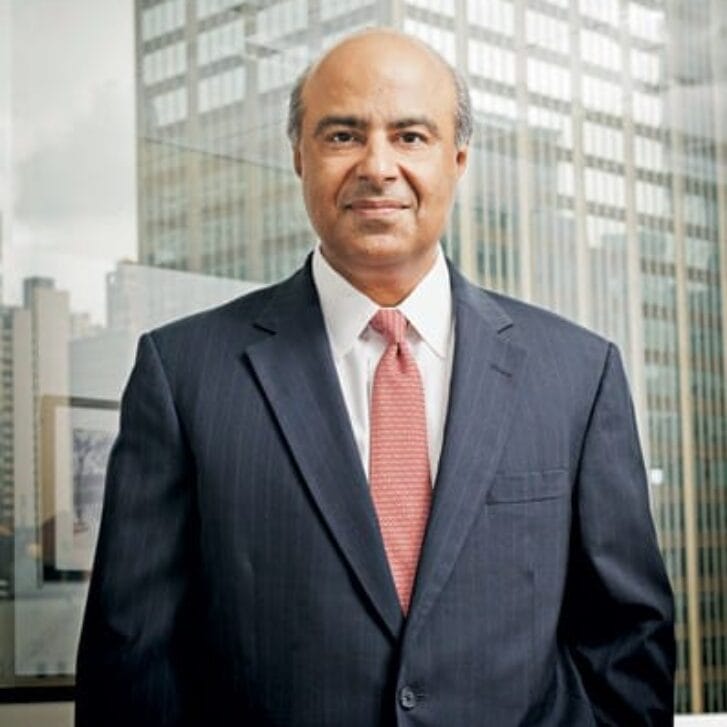Wharton Faculty in the Global Classroom

Wharton Professor Michael Useem
Bill Gates thinks that business and government can do more to help the world’s poor. In his plenary address at the World Economic Forum (WEF) in Davos, Switzerland in January, Gates offered his expanded version of corporate social responsibility, which would harness the self-interest of free markets to benefit the world’s neediest people. Gates calls his new idea “creative capitalism.” Listening to Gates that day were Wharton professors Howard Kunreuther and Michael Useem, who joined more than 2,000 of the world’s leading business and political figures at the 38th annual WEF meeting.
“This event has come to serve as one of globalization’s best classrooms,” said Useem. “For me and many others, Davos constitutes an unrivaled personal window into the global issues of the moment.” At the WEF, Useem moderated a session on “The Rising Influence of Minority Shareholders” and served on a panel about “The DNA of Effective Boards.” Kunreuther participated in three panels: “The Threats of Biotechnology,” “Global Risk,” and “Organizational Risk and Resiliency.”
Based on their seminal research at Wharton’s Risk Management and Decision Processes Center, Kunreuther and Erwann Michel-Kerjan, managing director of the Risk Center and a WEF Young Global Leader, along with Wharton professor Witold Henisz, were asked to develop risk scenarios for the WEF’s Global Risks Report 2008. This is the third consecutive WEF global risk report to which the Wharton Risk Center has contributed. “The WEF is interested in mitigating global risks—in preventing the domino effect of a catastrophic event,” says Kunreuther. “Because of interdependencies between nations and industries, catastrophic hazards are only going to get worse.”
Indeed, the Global Risks Report 2008 warned of the highest levels of political and economic uncertainty in a decade, expressing fears about a U.S. recession and its effect on world economies, the future security of the food supply, and concerns about energy supplies and the need for cleaner energy. For more information, see www.weforum.org.
New External Affairs Associate Dean
Ken Manotti, Wharton’s new associate dean of external affairs, brings extensive fundraising and alumni relations experience from Penn as well as other universities in the U.S. and abroad. Manotti initially came to Penn in 1978 as a coordinator in the Middle East Center. During his 14 years at the university, he held various positions including assistant director of the Wharton Applied Research Center, manager of operations for on-campus recruiting, director of development operations in Wharton External Affairs, associate director of alumni giving, director of 25th reunion programs, and director of development and corporate relations for the Joseph H. Lauder Institute. He left Penn in 1992 to join the development staff at Columbia University.
During his tenure at Columbia, Manotti was part of a team that developed and implemented fundraising strategies for a $1-billion campaign. Most recently, he served as vice president of institutional advancement at the American University in Cairo, where he was responsible for leading a $100-million capital campaign, targeting donors in the United States, the Middle East, and Europe. Manotti holds a BA in English and political science with a concentration in Latin American studies from Dickinson College. In addition, he took graduate courses in international relations, Latin American relations, and Middle Eastern history and politics at Penn.
Wharton Leadership Conference Named a Top Executive Gathering
A top slate of influential speakers, from news analyst and White House advisor to four U.S. presidents David Gergen to American Express CEO Ken Chenault, will converge at Wharton this June for the 12th annual Wharton Leadership Conference. The June 18 event was cited in a recent Forbes.com article as the second most popular and beneficial executive-level “must-attend” event based on the number of all-star CEO speakers, second only to the Fortune Innovation/Fortune iMeme conference.

Wharton Professor Peter Cappelli
This year’s event—which will also include William Weldon, chair and CEO of Johnson & Johnson; Colleen C. Barrett, president and corporate secretary for Southwest Airlines; and Wharton professors Peter Cappelli and Michael Useem, among other high-level executives—focuses on “Emerging Trends in the Search for Leadership.” For more information or to register for the event, call 215.898.5605 or see http://leadershipconference.wharton.upenn.edu.
Siemens’ Loscher Speaks at Leadership Lecture
Peter Loscher openly acknowledges that his first and most difficult task after taking the job of CEO of global conglomerate Siemens AG last July was dealing with the aftermath of a scandal that included allegations of bribes to foreign governments and union leaders. During a recent Wharton Leadership Lecture Series talk, the 49-year-old talked about these and other challenges he faced as the first outsider to lead the 161-year-old engineering and health care giant.
“Corruption exists in the whole world; but it’s not in our marketing plan,” Loscher told the Wharton audience in explaining his moves to aggressively change the firm’s culture and standards. “It is not the business we are interested in, and it’s not a sustainable business model, either.”
In addition to Loscher, speakers at recent Wharton Leadership Lectures include Carter Roberts, president and CEO of the U.S. World Wildlife Fund; Kevin Roberts, CEO of Saatchi & Saatchi; and Dieter Zetsche, chairman of the board of management at Daimler AG.
Julie and Ken Moelis Give $5 Million to Wharton Sports Business Initiative

Julie Taffet Moelis, W’81, and Kenneth D. Moelis, W’81, WG’81
In one of the largest contributions ever given to support research on the business of sports, alumni Julie Taffet Moelis, W’81, and Kenneth D. Moelis, W’81, WG’81, recently gave a $5-million gift to support the Wharton Sports Business Initiative (WSBI). Led by Wharton professor Kenneth Shropshire, the WSBI is a research and executive education think tank that focuses on the sports industry through educational programs, corporate partnerships, student consulting assignments, global outreach, and research.
WSBI also partners with Wharton Executive Education in running the NFL Business Management and Entrepreneurial Program, which assists NFL players in preparing for their post-playing careers. One hundred and fourteen NFL players from teams across the nation recently participated in the program. “Through their gift, the Moelis family will help us to take our research to the next level, which will enhance the School’s position as a global thought leader in this field,” Shropshire said. The Moelis family has a strong legacy at Wharton.
Ken currently serves on the School’s Board of Overseers and is chief executive officer of Moelis & Company, an investment bank he founded in July 2007. Ken’s father, Herb, W’53, and two siblings, Ron, W’78, and Cindy, W’83, also graduated from Wharton. Currently, the couple’s eldest sons, Jordan and Cory, attend the School. In 2002, Julie and Ken Moelis made a substantial contribution to support the construction of Jon M. Huntsman Hall. More recently, they established an endowed scholarship for Wharton undergraduates.
Prof. Raffi Amit Helms Wharton West Panel on VC Trends
Venture capital is thriving at the moment—top firms are flush with money, and they’re moving ahead smartly with investments. But in some ways, the sector and the technology firms that it funds are still haunted by the bursting of the tech bubble in 2001. So said a panel of experts who gathered before reporters in February as part of the Wharton Seminars for Business Journalists at Wharton West, the Wharton School’s campus in downtown San Francisco. “Last year was very good in North America,” said
Raffi Amit, academic director of Wharton’s Goergen Entrepreneurial Management Program and an expert in entrepreneurship and venture capital. “There was $30 billion invested—the highest amount since the bursting of the bubble. About half of that was invested in information technology and a third in health care.”
Money is gushing into start-ups because venture capitalists are sitting on a trove of cash at the moment—more than $80 billion, Amit pointed out, and a wealth of IPOs and mergers has created a virtuous circle, encouraging even more venture investments. In other words, psychology matters in venture capital, as it matters in any market. When people feel good about the prospects for their industry, they invest more. For more of Amit’s comments on venture capital, see Get it Started!, the online newsletter of Wharton Entrepreneurial Programs, at http://wep.wharton.upenn.edu/gis/.
Professor Awarded Sloan Fellowship
Management professor David Hsu has been named a 2008 Sloan Industry Studies Fellow. Hsu, an assistant professor, was one of five young researchers cited by the Foundation for ground-breaking investigational work. Sloan Fellows receive a $45,000 grant to pursue any line of research they choose. Hsu, the Edward B. and Shirley R. Shils Term Assistant Professor of Management, joined Wharton in 2002. His research looks at startup innovation, strategies for commercializing technological innovation, venture capital, and intellectual property rights.

Wharton Professor G. Richard Shell
Former Chrysler chairman Lee Iacocca once noted, “You can have brilliant ideas; but if you can’t get them across, your ideas won’t get you anywhere.”
In their new book, The Art of Woo: Using Strategic Persuasion to Sell Your Ideas,Wharton legal studies and business ethics professor G. Richard Shell and management consultant Mario Moussa provide a systematic approach to idea selling that addresses the problem Iacocca identified. The word “woo,” the authors note, has many meanings, but all of them relate to focusing on the person you are trying to persuade more than on your own needs and fears. “There is the obvious meaning related to courtship and romance,” says Shell, “but there is also the more general idea of wooing people to seek their support.”
However “woo” is defined, the authors argue that effectively selling ideas—using persuasion rather than force—is one of the most important skills that everyone from CEOs and entrepreneurs to team leaders and mid-level managers need to learn if they want to be effective in their organizations.
Other recent books by Wharton faculty include:
Being Sugar Ray: The Life of Sugar Ray Robinson, America’s Greatest Boxer and First Celebrity Athlete, by Kenneth Shropshire
Marketing That Works: How Entrepreneurial Marketing Can Add Sustainable Value to Any Sized Company, by Howard L. Morgan, Shellye Archambeau, and Leonard Lodish
Stocks for the Long Run, 4th edition, by Jeremy Siegel
Talent on Demand: Managing Talent in an Age of Uncertainty, by Peter Cappelli
UBS/Wharton Program Helps Women in Career Transition
How can professional women who have interrupted their careers for family or other personal reasons jump back into a challenging career? For the second consecutive year, UBS and Wharton Executive Education partnered this April to help a group of former professionals navigate the obstacles of returning to the workforce. In a unique program that reflects big companies’ increased hunger for talent, the full-to-capacity
UBS Career Comeback: A Fellowship Program for Professional Women Re-Entering the Workforce” gave participants specific tools to ease their transition back to work, such as updates on recent technological advances and regulatory changes as well as specific tips on managing a smaller professional network and increased family responsibilities. After two days at Wharton, participants attended an additional day of training at UBS in New York City, where they paired with peer coaches.
The program was facilitated by academic director and Wharton adjunct faculty member Monica McGrath, whose 2004-2005 study of women in the workforce found that 43% of women surveyed stayed out of the workforce longer than they expected. Those who did return often joined smaller companies, shifted industries, and in general faced a difficult transition.
Entrepreneurial Education Program Launched for Women in Developing Countries
Wharton Executive Education will offer a significant leg-up to aspiring women entrepreneurs in China, India, and Egypt through a program launched this March. The Women Entrepreneurship Education Initiative is a part of The Goldman Sachs Group’s 10,000 Women initiative, a project with partner schools around the world that will provide business and management education to 10,000 under-served women, largely those in developing and emerging markets. “Business schools can be a force for good in the world, and this collaboration is an excellent way of fulfilling that promise,” says Wharton Dean Thomas S. Robertson.
The Initiative will offer a Certificate of Professional Development for Women Entrepreneurs, providing participants with essential business knowledge to build and lead successful businesses. Wharton Executive Education will design the program and deliver it in collaboration with local partners such as the American University in Cairo, Egypt, and the Indian School of Business in Hyderabad, India. It will also use classroom sessions, workshops, and distance learning modules coordinated through Knowledge@Wharton.
And the (Almost) Winners Are…
A soothing sock for amputees and a sustainable approach to bottled water were among the 25 semi-finalists of this year’s Wharton Business Plan Competition (BPC). These semi-finalists will next compete for up to $70,000 in prizes and the chance to present their business plan at the annual Venture Finals on April 30. A part of Wharton Entrepreneurial Programs, the BPC this year celebrates its 10th anniversary (see related feature story on page 22).
This year 344 students participated in early phases of the competition, with Internet concepts dominating the field once again. Ideas centered on IT, life sciences, and consumer products were also popular in the early rounds. For the semi-finals, judges chose ventures—medical devices, regionally focused services, disease management therapies—serving specific market niches. Only one energy related concept was selected.
The Venture Finals will bring together eight finalist teams selected from among the 25 semi-finalists. These eight will face off with 20-minute presentations to judges drawn from the business and venture capital community. For more information on the BPC, see http://bpc.wharton.upenn.edu/.


























